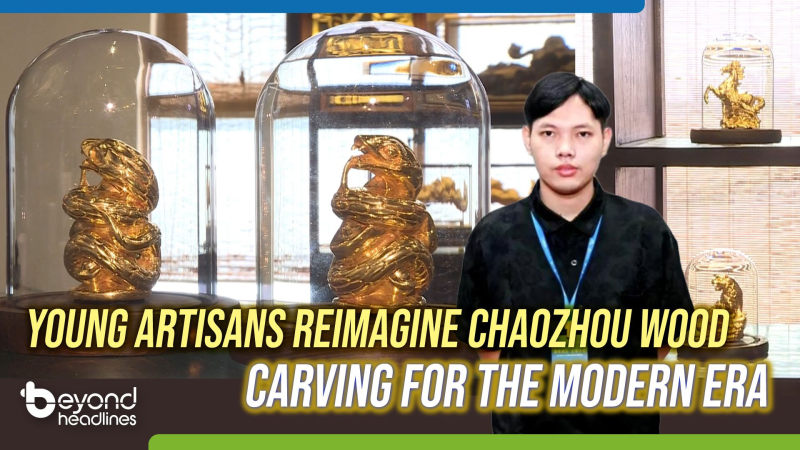B: Oops.....
B: What should I do?
You need to exert more effort. The size is just right. Now it’s fixed.
Mamuti Reheman / Musical Instrument Craftsman
The first step is to use this hairy cow horn and cow bone for decoration by cutting them into strips and then break them into pieces.
Reziya Aierken / Translator
The process of creating this pattern alone takes 20 days to a month using this material, resulting in a price range of 5,000 to 10,000 RMB.
When we stepped into the ethnic musical instrument village, we came across a photo of a family crafting musical instruments. We learned that this family has been passing down the tradition of instrument-making through generations, and Mamuti, one of the family members, kindly taught us how to make musical instruments.
V: I just saw a photo with an old man in it. Who is he?
Mamuti Reheman / Musical Instrument Craftsman
My father’s grandfather.
B: From your dad’s grandfather, your grandfather, your dad, to you. You are the fourth generation. Do you feel a great sense of responsibility?
Of course, my responsibility is significant because I want to pass it down from generation to generation. I started learning how to make musical instruments from my dad since I was young. My father emphasized the importance of passing down this skill from generation to generation and not giving up when facing challenges. Because my father is the heir to the instrument maker, he has very strict requirements for me. He gives me stringent instructions, having a positive impact on our family’s instrument-making reputation.
During lunchtime, we followed Mamuti back to his home. In the courtyard, we also saw Mamuti’s father who has been retired but is still helping Manuti to make dutar’s resonance box and other parts day to day.
V: Oh, you have this large mulberry wood, and continue to dig it slowly.
B: How heavy is it? Wow, it’s quite heavy!
B: It’s been more than 200 years.
Kuerbanjiang Duolikun / Translator
Now it’s more refined and beautiful.
Mamuti Reheman / Musical Instrument Craftsman
Nowadays, there are instruments made by machines. However, the sound of instruments made by machines and those made by hand is different. The latter one is more beautiful and resonates well. Therefore, we will not consider using machines to make them.
The ‘Musical Instrument Village’ was designated as the ‘National Demonstration Base for productive protection of intangible cultural heritage’ by the Ministry of Culture in 2011. This village has a rich history of crafting musical instruments for over 150 years. Currently, more than 70 peasant families in the village are primarily engaged in the production of musical instruments, constituting approximately one-tenth of the total households. With national support, craftsmen in the village's ethnic musical instrument workshop receive an annual subsidy of 10,000 to 40,000 RMB, enabling them to dedicate their efforts to the production and preservation of ethnic musical instruments such as the dutar.
Young inheritors have derived new ways to promote ethnic music. Mamuti shared with us that he sold more than 100 musical instruments online in 2022 by playing ethnic music and selling the instruments through live streaming. Meanwhile, Aximu, born in 1992, is the youngest craftsman in the instrument workshop who also promotes his work on TikTok. He has taken on the responsibility of selling instruments online. How did he start making instruments in the first place?
Anniwaer Aximu / Musical Instrument Craftsman
I sought to learn from Master Tuhati because of his renowned reputation in the village. Upon my arrival, he tested my determination by assigning me household chores instead of teaching me any real skills. After observing my perseverance and dedication, Master Tuhati eventually passed on his craftsmanship and knowledge to me.
B: Did you ever consider giving up when Master Tuhati did not teach you any skills before that?
Anniwaer Aximu / Musical Instrument Craftsman
No. I have never thought of giving up and just remained determined.
Master Tuhati, Aximu's teacher, has been crafting ethnic musical instruments for 52 years and has imparted his knowledge to numerous students. He told us that completing an apprenticeship normally takes three to three and a half years. Even for those with good talent, it still requires at least two years to learn the basic craft. Unfortunately, many young people are unable to endure the rigorous training and give up midway.
Tuhati Rouzi / Musical Instrument Craftsman
Some youngsters came here and just loafed around; some did not work and could not learn even if they were taught; some youngsters were really determined, and their parents and family members were very supportive. I would take such children as my apprentices and let them work with peace of mind.
V: I know you made a very large dutar that broke Guinness World Records. What was the reason for making it?
Tuhati Rouzi / Musical Instrument Craftsman
In order to better showcase the craftsmanship of this ethnic musical instrument, I make them so large that the process of making the instrument can be better displayed. I am 68 years old this year and I choose to continue making instruments until the last moment of my life.
B: I know that you made this with your son. Did you guys encourage each other when making it?
Tuhati Rouzi / Musical Instrument Craftsman
There were conflicts because my requirements were relatively high. If my son did not follow my requirements when making decorations, I would get annoyed. If I don’t have time to take care of these decorations, my wife will also help me put them on.
B: That’s what the whole family is doing together. Would you test their determination?
Tuhati Rouzi / Musical Instrument Craftsman
If they don’t do it well, I’ll beat them. Hahaha…
V: You have been doing the same thing for over 50 years, which is essentially doing one thing well in your lifetime. What does it mean to you?
Tuhati Rouzi / Musical Instrument Craftsman
It used to be futile to do this, but now that life is better, it seems that guests far away also come to see it. This allows me to promote and pass on this skill, and I am getting more income as well.
China’s Xinjiang Ethnic Musical Instrument Village is a national 3As scenic spot. Here, craftsmen can showcase their skills and techniques in instrument making to tourists. You can see them enjoying themselves, with happy smiles on their faces, and they will play instruments at will.
V: As a musician, They always tell me that it is impossible to make a living in Hong Kong with music only. You should do this, and do that, so that I can make my ends meet and you can be happy. But here, what I learned from the craftsmen is that you can just do one thing in your lifetime, and then put in all the hard work and the devotion, and make it the best, pass it on from generation to generation and this will make you feel happy and blissful.
B: Just now, when we had a close look at the craftsmen making the musical instruments, I noticed that they have got calluses on their hands.The reason they keep doing this, is that Music can make people happy. Yes, that’s so true. Everytime when hear their music, I want to join them and dance with them! I am so impressed by their passion and commitment.












